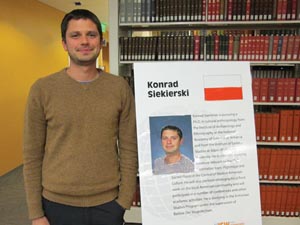Emma Shaljyan
Staff Writer

How did a graduate student from Poland find himself in Fresno doing research in Armenian Studies? As an undergraduate student Konrad Siekierski visited Turkey in 2001 and he was so impressed by the remnants of the Armenian cultural heritage he saw, including the ruins of Ani, the city of Van, and the monastery of Akhtamar, that he decided to go to Armenia one day to see the living culture.
This idea came true in 2005, after his successful submission of a M.A. research project on the topic of “The Situation of the Armenian Apostolic Church in post-Soviet Armenia.” This research project brought together his two main fields of scholarly interest: the anthropology of religion and the anthropology of post-socialism.
This is Siekierski’s third visit to the United States. In March 2009 he participated in a conference, “Armenian Studies at a Threshold: Celebrating the 35th Anniversary of the Society for Armenian Studies,” where he met Prof. Barlow Der Mugrdechian for the first time. A year later he participated in the 8th Armenian Graduate Students Colloquium organized at UCLA and after the event visited Fresno for a week.
Professor Der Mugrdechian recognized the novelty and importance for Armenian Studies of Siekierski’s research and invited the young Polish scholar for a stay at Fresno State as a Kazan Visiting Scholar, to continue research and to work on his thesis “Pilgrimage and Sacred Places in the Context of Modern Armenian Culture,” based on fieldwork he is doing in Armenia.
Siekierski received his B.A. and M.A degrees in Cultural Anthropology at the University of Warsaw. For the past few years he has spent most of his time in Armenia and in countries with an Armenian Diaspora.
In September 2007, Siekierski enrolled in a Ph.D. program in the Institute of Archeology and Ethnography of the National Academy of Sciences of Armenia, where he is working under the supervision of Dr. Levon Abrahamian. A year later he also became a Ph.D. candidate at the Institute of Eastern Studies at the Adam Mickiewicz University (Poland).
Siekierski’s Ph.D. dissertation concentrates on the modern period and includes attitudes of the institutional Church toward pilgrimage practice and folk/popular religiosity. He also conducted other projects in Armenia–on institutional revival of the Armenian Apostolic Church, on national discourse promoted by the Church, and on religious minorities in Armenia, including the neo-pagan movement.
Siekierski is also engaged in research on the contemporary Armenian Diaspora in Europe and North America. His primary place of fieldwork became Romania, where he spent five months in 2011 and three months in 2012.
“Every Armenian Diaspora has its own flavor and is unique with the way it mixes with local culture,” stated Siekierski.
Romania, where a small but diverse and active Armenian Diaspora includes descendants from Ani, Genocide survivors, and newcomers from post-Soviet Armenia, clearly is a good illustration of his point. Armenians in Romania belong to the Armenian Apostolic and Armenian Catholic churches, and while the former associate themselves mostly with Romanian culture, the latter have strong ties with the Hungarian minority in Romania.
During his stay in Fresno, Siekierski will study anthropological literature on pilgrimage, ritual, sacred places, and other relevant topics, as well as texts regarding religious life of Armenians in historical context. He also plans to do research on local Armenian communities.
Siekierski will also be preparing two volumes: The Anthropology of Modern Armenian Culture, will be published in Polish and will contain the works of leading cultural anthropologists from Armenia; and the Armenians in Post-Communist Europe will be published in English, and will cover topics on contemporary Armenian communities in Central and Eastern Europe. Siekierski will also participate in two conferences and conduct archival research at the Keston Centre for Religion, Politics and Society in Waco, Texas.
Siekierski likes the people, nature, landscape, and food of Armenia and finds Armenians to be friendly and open.
“Armenia is a good country to be a foreigner in,” he concluded.
 Hye Sharzhoom Armenian Action
Hye Sharzhoom Armenian Action